
The tokenization of US stocks is heating up, and Robinhood is rumored to be building its own Layer 2 to gain a foothold in the market.
When U.S. dollar stablecoins gradually gain market attention, companies inside and outside the crypto space have begun to see U.S. stocks as the next target.At the end of May, U.S. Cryptocurrency exchange Kraken announced that it would offer tokenized popular U.S. stocks to non-U.S. customers; on June 18, Coinbase Chief Legal Officer Paul Grewal revealed that the company is seeking SEC approval to launch a "tokenized stock" service.Tokenizing U.S. stocks is gradually becoming an explicit business.Now, this business may be welcoming a new player: Robinhood, a well-known U.S. internet brokerage, the "Boxer Rebellion" of retail investors, and a key force in the fight against Wall Street.Previously, two people familiar with the matter at Robinhood revealed to Bloomberg that they are developing a blockchain-based platform that will allow retail investors in Europe to trade U.S. stocks.According to people familiar with the matter, the technology selection for this platform may be Arbitrum or Solana, and the specific partner selection is still in progress, and the agreement has not been finalized.This news can at least be interpreted in two ways.First, Robinhood directly integrates Arbitrum L2 into this new platform that allows European users to trade U.S. stocks, as the underlying layer for its blockchain transactions;Second, and more likely, **Robinhood plans to use Arbitrum's Arbitrum Chains feature to develop its own dedicated L2 chain based on Arbitrum's technology stack (Rollup protocol, EVM compatibility, etc.)**.No matter which situation is the final one, market sentiment has been driven.This also means that Robinhood may enter the market itself to create an exclusive L2 for the tokenization of U.S. stocks, which is more conducive to the on-chain settlement and dedicated handling of this business.At the EthCC conference in Cannes, France, which will be held on the 30th, Robinhood will also announce an important announcement at 17:00 local time (23:00 Beijing time), which has led to speculation that it is related to doing its own L2 and U.S. stock tokenization business.At the same time, A.J. Warner, Chief Strategy Officer of Offchain Labs, the company behind Arbitrum, will also attend the conference, which gives everyone more room for imagination about a simultaneous official announcement.$ARB, whose price has been slightly dull recently, once broke through 20% in 24 hours, ranking among the top gainers in Cryptocurrency.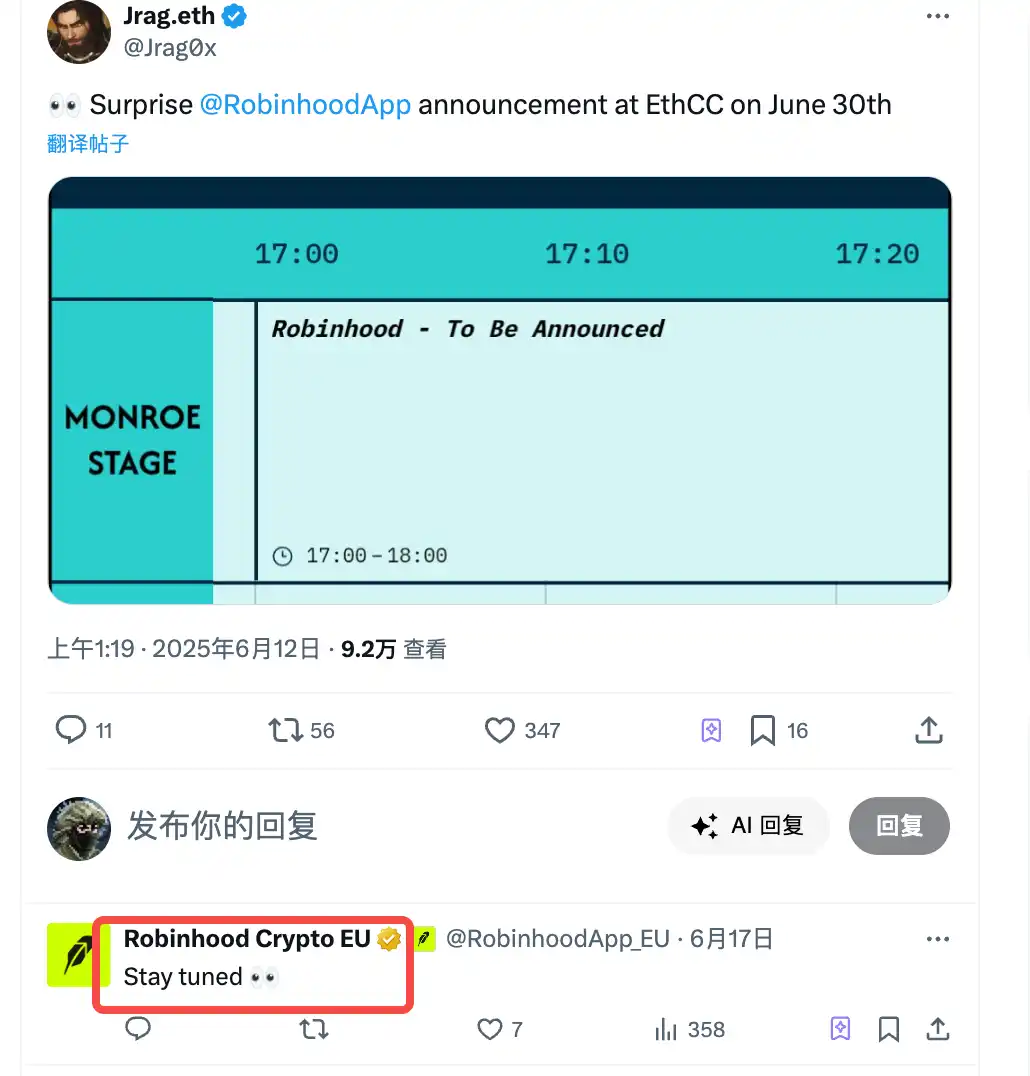 More suggestively, Robinhood Europe's X account left a message in the discussion thread of the conference agenda by netizens, replying "Stay tuned". Combining this with the news reported by Bloomberg that it will provide U.S. stock trading in Europe, the possibility of officially announcing this function has become higher.
More suggestively, Robinhood Europe's X account left a message in the discussion thread of the conference agenda by netizens, replying "Stay tuned". Combining this with the news reported by Bloomberg that it will provide U.S. stock trading in Europe, the possibility of officially announcing this function has become higher.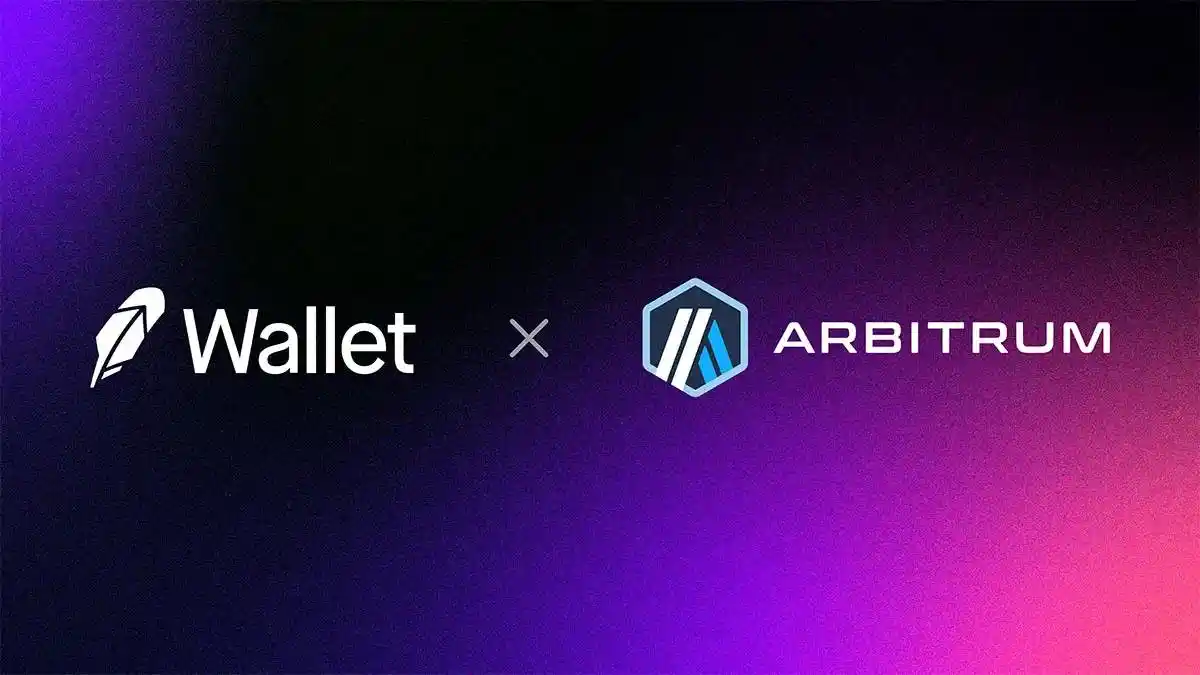 This shows that the two parties already have a foundation for technical integration and strategic alliance. Robinhood may choose to continue this cooperation and use Arbitrum's existing technical support and brand effect to further expand its business.
This shows that the two parties already have a foundation for technical integration and strategic alliance. Robinhood may choose to continue this cooperation and use Arbitrum's existing technical support and brand effect to further expand its business.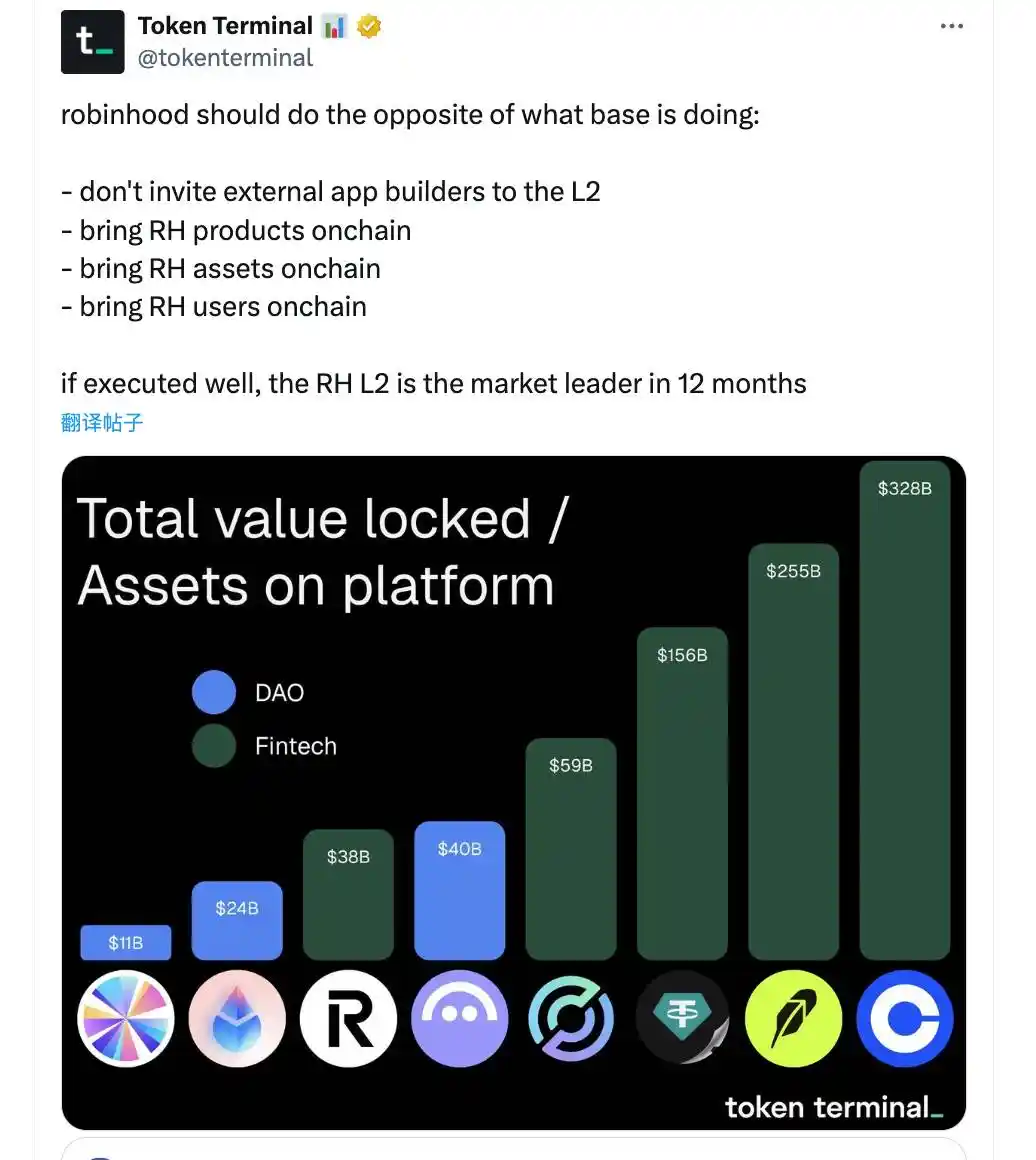 This idea is more Crypto Native, and it combines Robinhood's existing customer base with pure on-chain gameplay, but a more radical approach also means greater resistance, and Robinhood may not follow this path.If we step out of Robinhood and observe the entire Ethereum ecosystem, there are also some voices that believe that this will make the division of Ethereum L2 more serious.Ethereum L1 has already lost a lot of initiative in the current ecological situation where L2s are everywhere. Whether the performance is good or not is secondary. What is more important is complete marginalization and pipelining. It is easy to make an L2 dedicated to specific tasks, but it is difficult to revive the glory of Ethereum.What will Robinhood ultimately choose? We may get the answer after today's ETHcc.Original link [深潮 TechFlow]
This idea is more Crypto Native, and it combines Robinhood's existing customer base with pure on-chain gameplay, but a more radical approach also means greater resistance, and Robinhood may not follow this path.If we step out of Robinhood and observe the entire Ethereum ecosystem, there are also some voices that believe that this will make the division of Ethereum L2 more serious.Ethereum L1 has already lost a lot of initiative in the current ecological situation where L2s are everywhere. Whether the performance is good or not is secondary. What is more important is complete marginalization and pipelining. It is easy to make an L2 dedicated to specific tasks, but it is difficult to revive the glory of Ethereum.What will Robinhood ultimately choose? We may get the answer after today's ETHcc.Original link [深潮 TechFlow]
 More suggestively, Robinhood Europe's X account left a message in the discussion thread of the conference agenda by netizens, replying "Stay tuned". Combining this with the news reported by Bloomberg that it will provide U.S. stock trading in Europe, the possibility of officially announcing this function has become higher.
More suggestively, Robinhood Europe's X account left a message in the discussion thread of the conference agenda by netizens, replying "Stay tuned". Combining this with the news reported by Bloomberg that it will provide U.S. stock trading in Europe, the possibility of officially announcing this function has become higher.Everything is Traceable
Robinhood's idea of tokenizing U.S. stocks is not a whim.In January of this year, company CEO Vlad Tenev criticized the current U.S. regulations, believing that the United States has not provided a clear framework and rules for the registration of security tokens, which hinders the promotion of tokenized products.In a podcast in March, Tenev said very directly: "Right now, if you are overseas, it is very difficult to invest in an American company."This also hits the pain points of most investors who pay attention to the trends of U.S. stocks but are not physically in the United States. They urgently need a smoother way to trade U.S. stocks.At the same time, Tenev also said at the time that he was considering tokenizing securities, and pointed out that this would be part of a broader push to integrate digital assets into the financial system.Looking at it now, there are signs of paving the way.Currently, Robinhood's customers in the EU can only trade Cryptocurrencies, and the company obtained a brokerage license in Lithuania last month, allowing it to provide investment services such as stock trading in the EU.In addition, Robinhood also signed an agreement to acquire Cryptocurrency exchange Bitstamp in June last year. After the transaction is completed, Robinhood will be able to use Bitstamp's MiFID multilateral trading facility (MiFID) license to provide crypto-related derivatives.Now that the licenses have been obtained and the regulations have been complied with, the next step is to consider which chain to choose at the implementation level.Why Could it be Arbitrum?
From a technical point of view, Arbitrum is a fully EVM-compatible L2 solution, which means that Robinhood can seamlessly migrate its existing Ethereum smart contracts and development tools without significantly modifying its technology stack.EVM compatibility can be said to be the key for large financial technology companies such as Robinhood to quickly get on the chain. If they can take advantage of Ethereum's extensive developer community and existing infrastructure, who would put it aside?Furthermore, Arbitrum's Optimistic Rollup technology also strikes a balance between transaction confirmation time and cost; in contrast, ZK Rollup costs more and transaction confirmation time is relatively slower; Robinhood, as a platform that needs to handle large-scale user transactions, is more likely to prioritize Arbitrum's mature technology and lower development threshold.On the other hand, from a business perspective, **this choice also avoids Coinbase**.Base is an L2 launched by Coinbase, and it also uses the OP technology stack, but it is clear that because Robinhood has competition with Coinbase in its main business, it is unlikely to directly run the tokenization of U.S. stocks on Base.Arbitrum provides the option of custom L2 chains (Arbitrum Chains), which allows Robinhood to differentiate itself from Base.One piece of information you may have overlooked is that Robinhood and Arbitrum actually have experience working together.As early as the ETHDenver in 2024, Robinhood officially announced its cooperation with Arbitrum to simplify the process for users to access Arbitrum through Robinhood Wallet. This shows that the two parties already have a foundation for technical integration and strategic alliance. Robinhood may choose to continue this cooperation and use Arbitrum's existing technical support and brand effect to further expand its business.
This shows that the two parties already have a foundation for technical integration and strategic alliance. Robinhood may choose to continue this cooperation and use Arbitrum's existing technical support and brand effect to further expand its business.Imitate Base, Differentiate from Base
Although the news that Robinhood is building its own L2 with Arbitrum has not been officially confirmed, it has already aroused widespread discussion in the crypto community.The most critical voice among them is that this gameplay is a simple imitation of Base.Base was launched by Coinbase and adopts an open strategy, inviting external developers to build DApps to expand the ecosystem and attract users and assets. The success of Base is partly due to this open ecosystem (for example, projects such as Aerodrome and Uniswap have migrated or built on it).If Robinhood also builds an L2 based on Arbitrum and opens it to external developers to expand the ecosystem and create more use cases for real-world assets to be put on the chain, even though the technology stack is different, this is already highly similar to Base's business strategy.In terms of perception, the key to easily creating this "imitation" impression is the lag.Don't forget that Coinbase launched Base as early as the end of 2023, and Robinhood is only now announcing its Arbitrum L2 plan. This time difference makes Robinhood's actions look like a "follow-up" reaction to Base's success, rather than an original strategy.In the traditional business field, financial technology companies usually tend to copy proven models, which is indeed a safer strategy; but imitating Base means that Robinhood will directly compete with Coinbase, and Coinbase has already established a first-mover advantage through Base. If Robinhood wants to overtake on a curve, it needs to invest more resources and effort.Token Terminal, a well-known data platform, has also pointed out a "clear path" for Robinhood. The core is to **magnify its advantages as an internet brokerage and take a "closed ecosystem" route that is the opposite of Base**:Do not invite external application developers to join its L2, but migrate all of Robinhood's existing financial products (such as trading or investment tools), assets, and users to the chain, allowing users to operate directly on the chain instead of relying on traditional centralized systems. This idea is more Crypto Native, and it combines Robinhood's existing customer base with pure on-chain gameplay, but a more radical approach also means greater resistance, and Robinhood may not follow this path.If we step out of Robinhood and observe the entire Ethereum ecosystem, there are also some voices that believe that this will make the division of Ethereum L2 more serious.Ethereum L1 has already lost a lot of initiative in the current ecological situation where L2s are everywhere. Whether the performance is good or not is secondary. What is more important is complete marginalization and pipelining. It is easy to make an L2 dedicated to specific tasks, but it is difficult to revive the glory of Ethereum.What will Robinhood ultimately choose? We may get the answer after today's ETHcc.Original link [深潮 TechFlow]
This idea is more Crypto Native, and it combines Robinhood's existing customer base with pure on-chain gameplay, but a more radical approach also means greater resistance, and Robinhood may not follow this path.If we step out of Robinhood and observe the entire Ethereum ecosystem, there are also some voices that believe that this will make the division of Ethereum L2 more serious.Ethereum L1 has already lost a lot of initiative in the current ecological situation where L2s are everywhere. Whether the performance is good or not is secondary. What is more important is complete marginalization and pipelining. It is easy to make an L2 dedicated to specific tasks, but it is difficult to revive the glory of Ethereum.What will Robinhood ultimately choose? We may get the answer after today's ETHcc.Original link [深潮 TechFlow]Source
Powered by ChatGPT
All You Need to Know in 10s

Your One-Stop Crypto Investment Powerhouse
The tokenization of US stocks is heating up, and Robinhood is rumored to be building its own Layer 2 to gain a foothold in the market.
When U.S. dollar stablecoins gradually gain market attention, companies inside and outside the crypto space have begun to see U.S. stocks as the next target.At the end of May, U.S. Cryptocurrency exchange Kraken announced that it would offer tokenized popular U.S. stocks to non-U.S. customers; on June 18, Coinbase Chief Legal Officer Paul Grewal revealed that the company is seeking SEC approval to launch a "tokenized stock" service.Tokenizing U.S. stocks is gradually becoming an explicit business.Now, this business may be welcoming a new player: Robinhood, a well-known U.S. internet brokerage, the "Boxer Rebellion" of retail investors, and a key force in the fight against Wall Street.Previously, two people familiar with the matter at Robinhood revealed to Bloomberg that they are developing a blockchain-based platform that will allow retail investors in Europe to trade U.S. stocks.According to people familiar with the matter, the technology selection for this platform may be Arbitrum or Solana, and the specific partner selection is still in progress, and the agreement has not been finalized.This news can at least be interpreted in two ways.First, Robinhood directly integrates Arbitrum L2 into this new platform that allows European users to trade U.S. stocks, as the underlying layer for its blockchain transactions;Second, and more likely, **Robinhood plans to use Arbitrum's Arbitrum Chains feature to develop its own dedicated L2 chain based on Arbitrum's technology stack (Rollup protocol, EVM compatibility, etc.)**.No matter which situation is the final one, market sentiment has been driven.This also means that Robinhood may enter the market itself to create an exclusive L2 for the tokenization of U.S. stocks, which is more conducive to the on-chain settlement and dedicated handling of this business.At the EthCC conference in Cannes, France, which will be held on the 30th, Robinhood will also announce an important announcement at 17:00 local time (23:00 Beijing time), which has led to speculation that it is related to doing its own L2 and U.S. stock tokenization business.At the same time, A.J. Warner, Chief Strategy Officer of Offchain Labs, the company behind Arbitrum, will also attend the conference, which gives everyone more room for imagination about a simultaneous official announcement.ARB, whose price has been slightly dull recently, once broke through 20% in 24 hours, ranking among the top gainers in Cryptocurrency.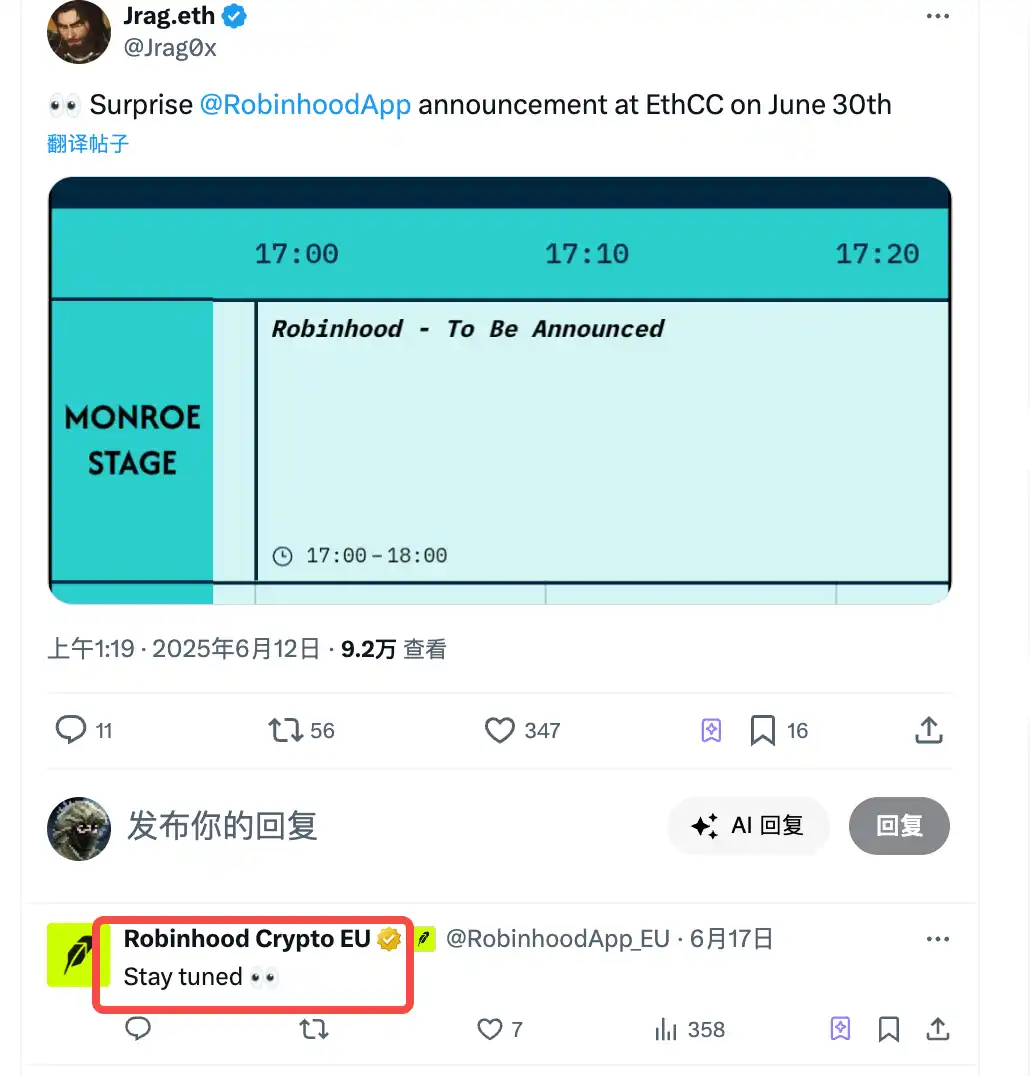 More suggestively, Robinhood Europe's X account left a message in the discussion thread of the conference agenda by netizens, replying "Stay tuned". Combining this with the news reported by Bloomberg that it will provide U.S. stock trading in Europe, the possibility of officially announcing this function has become higher.
More suggestively, Robinhood Europe's X account left a message in the discussion thread of the conference agenda by netizens, replying "Stay tuned". Combining this with the news reported by Bloomberg that it will provide U.S. stock trading in Europe, the possibility of officially announcing this function has become higher.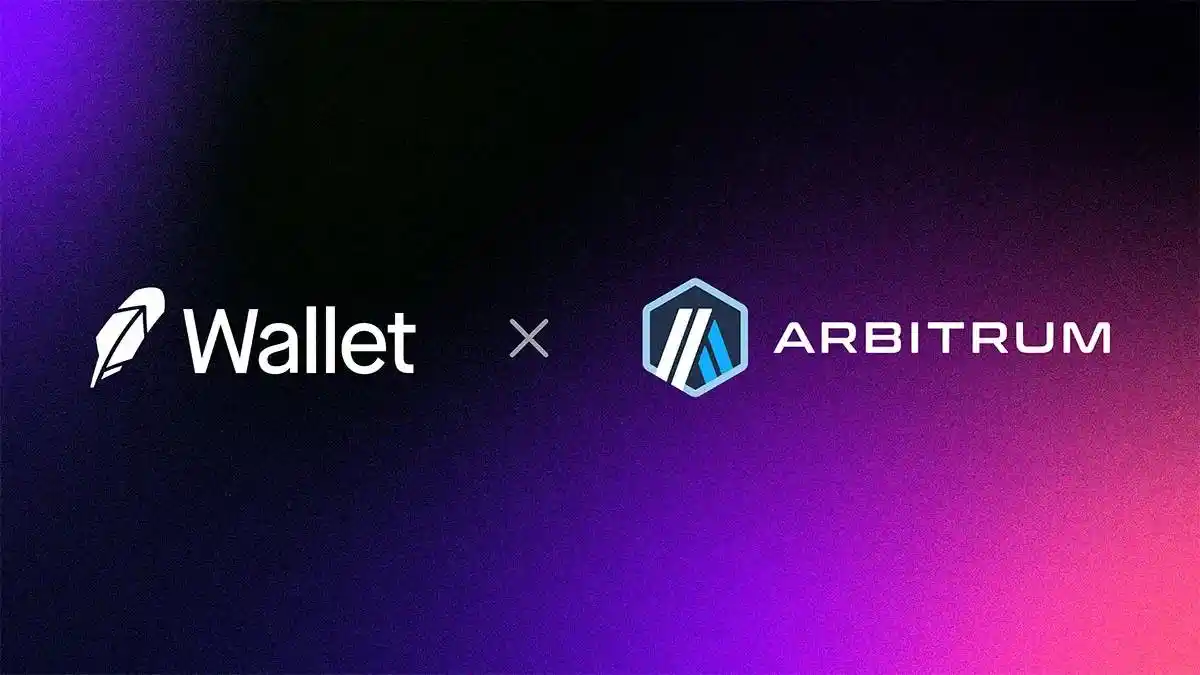 This shows that the two parties already have a foundation for technical integration and strategic alliance. Robinhood may choose to continue this cooperation and use Arbitrum's existing technical support and brand effect to further expand its business.
This shows that the two parties already have a foundation for technical integration and strategic alliance. Robinhood may choose to continue this cooperation and use Arbitrum's existing technical support and brand effect to further expand its business.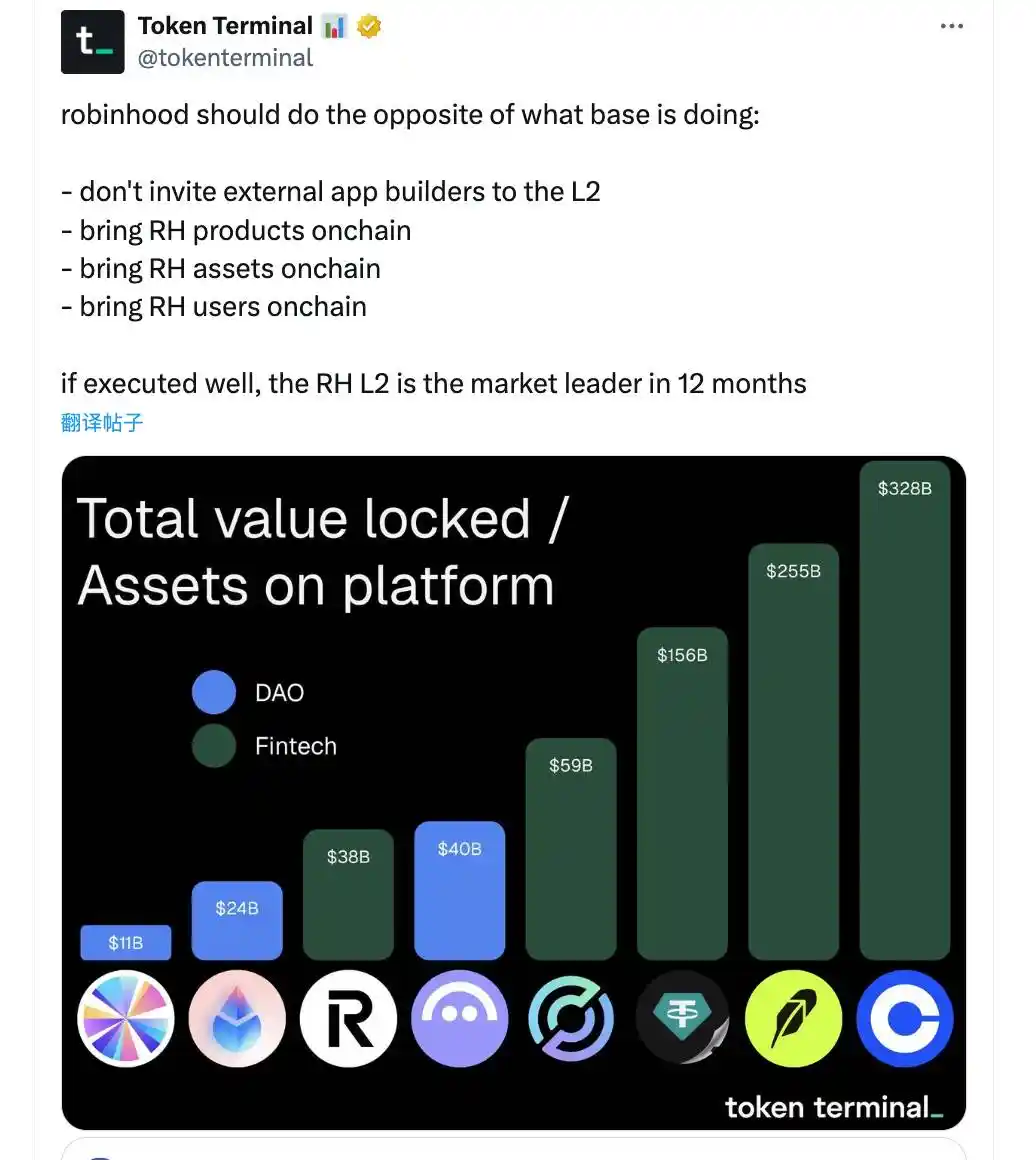 This idea is more Crypto Native, and it combines Robinhood's existing customer base with pure on-chain gameplay, but a more radical approach also means greater resistance, and Robinhood may not follow this path.If we step out of Robinhood and observe the entire Ethereum ecosystem, there are also some voices that believe that this will make the division of Ethereum L2 more serious.Ethereum L1 has already lost a lot of initiative in the current ecological situation where L2s are everywhere. Whether the performance is good or not is secondary. What is more important is complete marginalization and pipelining. It is easy to make an L2 dedicated to specific tasks, but it is difficult to revive the glory of Ethereum.What will Robinhood ultimately choose? We may get the answer after today's ETHcc.Original link [深潮 TechFlow]
This idea is more Crypto Native, and it combines Robinhood's existing customer base with pure on-chain gameplay, but a more radical approach also means greater resistance, and Robinhood may not follow this path.If we step out of Robinhood and observe the entire Ethereum ecosystem, there are also some voices that believe that this will make the division of Ethereum L2 more serious.Ethereum L1 has already lost a lot of initiative in the current ecological situation where L2s are everywhere. Whether the performance is good or not is secondary. What is more important is complete marginalization and pipelining. It is easy to make an L2 dedicated to specific tasks, but it is difficult to revive the glory of Ethereum.What will Robinhood ultimately choose? We may get the answer after today's ETHcc.Original link [深潮 TechFlow]
 More suggestively, Robinhood Europe's X account left a message in the discussion thread of the conference agenda by netizens, replying "Stay tuned". Combining this with the news reported by Bloomberg that it will provide U.S. stock trading in Europe, the possibility of officially announcing this function has become higher.
More suggestively, Robinhood Europe's X account left a message in the discussion thread of the conference agenda by netizens, replying "Stay tuned". Combining this with the news reported by Bloomberg that it will provide U.S. stock trading in Europe, the possibility of officially announcing this function has become higher.Everything is Traceable
Robinhood's idea of tokenizing U.S. stocks is not a whim.In January of this year, company CEO Vlad Tenev criticized the current U.S. regulations, believing that the United States has not provided a clear framework and rules for the registration of security tokens, which hinders the promotion of tokenized products.In a podcast in March, Tenev said very directly: "Right now, if you are overseas, it is very difficult to invest in an American company."This also hits the pain points of most investors who pay attention to the trends of U.S. stocks but are not physically in the United States. They urgently need a smoother way to trade U.S. stocks.At the same time, Tenev also said at the time that he was considering tokenizing securities, and pointed out that this would be part of a broader push to integrate digital assets into the financial system.Looking at it now, there are signs of paving the way.Currently, Robinhood's customers in the EU can only trade Cryptocurrencies, and the company obtained a brokerage license in Lithuania last month, allowing it to provide investment services such as stock trading in the EU.In addition, Robinhood also signed an agreement to acquire Cryptocurrency exchange Bitstamp in June last year. After the transaction is completed, Robinhood will be able to use Bitstamp's MiFID multilateral trading facility (MiFID) license to provide crypto-related derivatives.Now that the licenses have been obtained and the regulations have been complied with, the next step is to consider which chain to choose at the implementation level.Why Could it be Arbitrum?
From a technical point of view, Arbitrum is a fully EVM-compatible L2 solution, which means that Robinhood can seamlessly migrate its existing Ethereum smart contracts and development tools without significantly modifying its technology stack.EVM compatibility can be said to be the key for large financial technology companies such as Robinhood to quickly get on the chain. If they can take advantage of Ethereum's extensive developer community and existing infrastructure, who would put it aside?Furthermore, Arbitrum's Optimistic Rollup technology also strikes a balance between transaction confirmation time and cost; in contrast, ZK Rollup costs more and transaction confirmation time is relatively slower; Robinhood, as a platform that needs to handle large-scale user transactions, is more likely to prioritize Arbitrum's mature technology and lower development threshold.On the other hand, from a business perspective, **this choice also avoids Coinbase**.Base is an L2 launched by Coinbase, and it also uses the OP technology stack, but it is clear that because Robinhood has competition with Coinbase in its main business, it is unlikely to directly run the tokenization of U.S. stocks on Base.Arbitrum provides the option of custom L2 chains (Arbitrum Chains), which allows Robinhood to differentiate itself from Base.One piece of information you may have overlooked is that Robinhood and Arbitrum actually have experience working together.As early as the ETHDenver in 2024, Robinhood officially announced its cooperation with Arbitrum to simplify the process for users to access Arbitrum through Robinhood Wallet. This shows that the two parties already have a foundation for technical integration and strategic alliance. Robinhood may choose to continue this cooperation and use Arbitrum's existing technical support and brand effect to further expand its business.
This shows that the two parties already have a foundation for technical integration and strategic alliance. Robinhood may choose to continue this cooperation and use Arbitrum's existing technical support and brand effect to further expand its business.Imitate Base, Differentiate from Base
Although the news that Robinhood is building its own L2 with Arbitrum has not been officially confirmed, it has already aroused widespread discussion in the crypto community.The most critical voice among them is that this gameplay is a simple imitation of Base.Base was launched by Coinbase and adopts an open strategy, inviting external developers to build DApps to expand the ecosystem and attract users and assets. The success of Base is partly due to this open ecosystem (for example, projects such as Aerodrome and Uniswap have migrated or built on it).If Robinhood also builds an L2 based on Arbitrum and opens it to external developers to expand the ecosystem and create more use cases for real-world assets to be put on the chain, even though the technology stack is different, this is already highly similar to Base's business strategy.In terms of perception, the key to easily creating this "imitation" impression is the lag.Don't forget that Coinbase launched Base as early as the end of 2023, and Robinhood is only now announcing its Arbitrum L2 plan. This time difference makes Robinhood's actions look like a "follow-up" reaction to Base's success, rather than an original strategy.In the traditional business field, financial technology companies usually tend to copy proven models, which is indeed a safer strategy; but imitating Base means that Robinhood will directly compete with Coinbase, and Coinbase has already established a first-mover advantage through Base. If Robinhood wants to overtake on a curve, it needs to invest more resources and effort.Token Terminal, a well-known data platform, has also pointed out a "clear path" for Robinhood. The core is to **magnify its advantages as an internet brokerage and take a "closed ecosystem" route that is the opposite of Base**:Do not invite external application developers to join its L2, but migrate all of Robinhood's existing financial products (such as trading or investment tools), assets, and users to the chain, allowing users to operate directly on the chain instead of relying on traditional centralized systems. This idea is more Crypto Native, and it combines Robinhood's existing customer base with pure on-chain gameplay, but a more radical approach also means greater resistance, and Robinhood may not follow this path.If we step out of Robinhood and observe the entire Ethereum ecosystem, there are also some voices that believe that this will make the division of Ethereum L2 more serious.Ethereum L1 has already lost a lot of initiative in the current ecological situation where L2s are everywhere. Whether the performance is good or not is secondary. What is more important is complete marginalization and pipelining. It is easy to make an L2 dedicated to specific tasks, but it is difficult to revive the glory of Ethereum.What will Robinhood ultimately choose? We may get the answer after today's ETHcc.Original link [深潮 TechFlow]
This idea is more Crypto Native, and it combines Robinhood's existing customer base with pure on-chain gameplay, but a more radical approach also means greater resistance, and Robinhood may not follow this path.If we step out of Robinhood and observe the entire Ethereum ecosystem, there are also some voices that believe that this will make the division of Ethereum L2 more serious.Ethereum L1 has already lost a lot of initiative in the current ecological situation where L2s are everywhere. Whether the performance is good or not is secondary. What is more important is complete marginalization and pipelining. It is easy to make an L2 dedicated to specific tasks, but it is difficult to revive the glory of Ethereum.What will Robinhood ultimately choose? We may get the answer after today's ETHcc.Original link [深潮 TechFlow]Powered by ChatGPT
Scan QR Code to Explore more key information
One-stop financial research platform for Crypto Investors
00:00 / 00:00
 00:00
00:0000:0000:00
